| Srl | Item |
| 1 |
ID:
170556
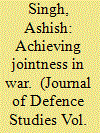

|
|
|
|
|
| Summary/Abstract |
The creation of the Chief of Defence Staff (CDS) is a start to defence reforms. This should improve jointmanship in peacetime; however, joint wartime performance needs further reform and improvement. We face three problems: (i) historical lack of unified warfighting strategy formulation at the apex military level; (ii) the unclear division of responsibility and resources between service Chiefs and Commanders-in-Chief (C-in-Cs); and (iii) the differing natures of command and control between the three services, which manifest as differences in structural organisations. Treating India as one unified theatre can reduce these problems. It will allow the creation of a joint structure for strategy formulation at the apex level, resulting in one national strategy to guide subordinate strategy. Also, it will give ownership of all warfighting assets to a single commander who can centralise or decentralise at will, and yet not preclude formation of smaller military entities with collocated headquarters (HQ) of subordinate service formations. Examples from history support the arguments.
|
|
|
|
|
|
|
|
|
|
|
|
|
|
|
|
| 2 |
ID:
170553
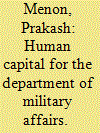

|
|
|
|
|
| Summary/Abstract |
The creation of the Department of Military Affairs (DMA) in the Ministry of Defence portends better civil-military cooperation. That India’s civil-military cooperation was in need of structural reform was never doubted. Yet, the implementation of such reform lacked political will, faced bureaucratic resistance, and was stymied by elements within the armed services. Political will has finally expressed itself and taken three major steps: the institution of the posts of Chief of Defence Staff (CDS) and Permanent Chairman Chiefs of Staff Committee (PC-COSC), and the creation of DMA with the CDS as its ex-officio head. Notably, the DMA is expected to have some optimum mix of civil and military domain experts that would work under a military head who is the Principal Military Adviser to the Defence Minister.
|
|
|
|
|
|
|
|
|
|
|
|
|
|
|
|
| 3 |
ID:
170562
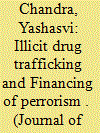

|
|
|
|
|
| Summary/Abstract |
The revenue generated from the drug trafficking business constitutes a fifth of the organised crime revenues, with annual worldwide value of the trade estimated to be around $650 billion. As the trafficking of drugs provides a lucrative opportunity, transnational terror groups such as Al- Qaeda, the Islamic State and their affiliates are increasingly using illicit drug trade to fund their expenses and operational costs. Further, with the increasing surveillance of the funding routes of terror by the security forces, the traditional sources of revenue have dried up. The investment in drug trafficking is low, and profits are high. Drug trade, therefore, provides terror groups with an adequate and sustained alternative means to generate funds.
|
|
|
|
|
|
|
|
|
|
|
|
|
|
|
|
| 4 |
ID:
170558


|
|
|
|
|
| Summary/Abstract |
The Imperial Japanese Navy’s (IJN) resurgence during the Meiji Restoration was challenged by the absence of maritime capability and an equivalent strategic underpinning. In turn, the IJN reached out to Western navies to develop its capability and establish its maritime moorings. The musings of Alfred Thayer Mahan served to fill this void. The IJN studied Mahan’s tenets and became particularly fixated on certain ideas which fuelled their tactics and hardened their war plans. Leading into the Second World War, the IJN remained oblivious to self-evident triggers for change, and its deep-seated doctrinal rigidity precluded questioning of the conceptions of Mahan, eventually underwriting their defeat in the Second World War.
|
|
|
|
|
|
|
|
|
|
|
|
|
|
|
|
| 5 |
ID:
170564
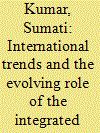

|
|
|
|
|
| Summary/Abstract |
The Indian economy’s development over the past decades has given rise to complex challenges. Policy makers thus needed to make institutional changes in financial management systems. In the system of Financial Advice, the Financial Advisers are expected to provide independent financial advice to the administrative authorities in decision making for achieving organisational goals. Allocated resources are to be spent timely and prudently in the prescribed manner to achieve predefined outcomes. Integrated Financial Advice (IFA) in defence has also developed and evolved in recent years. To further refine the present system, this article looks at comparative positions in the United States and in the United Kingdom to derive their best practices. These could be customised and adapted to suit Indian requirements, so that the IFA system functions with greater efficiency and effectiveness, thereby optimising the utilisation of precious resources towards enhanced combat readiness of our forces. One weakness in our governance is
|
|
|
|
|
|
|
|
|
|
|
|
|
|
|
|
| 6 |
ID:
170555
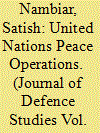

|
|
|
|
|
| Summary/Abstract |
We are passing through a decisive stage in the history of the international system. The threat of war between great states, or nuclear confrontation between major powers, is well behind us and, in fact, fading in our memory. However, new and diverse forms of threats, some clear and present, others only dimly perceived, are testing our resolve and questioning the validity of our existing mechanisms. Developments at the international level over the last two decades have exposed deep divisions within the membership of the United Nations (UN) over fundamental policies on peace and security.
|
|
|
|
|
|
|
|
|
|
|
|
|
|
|
|